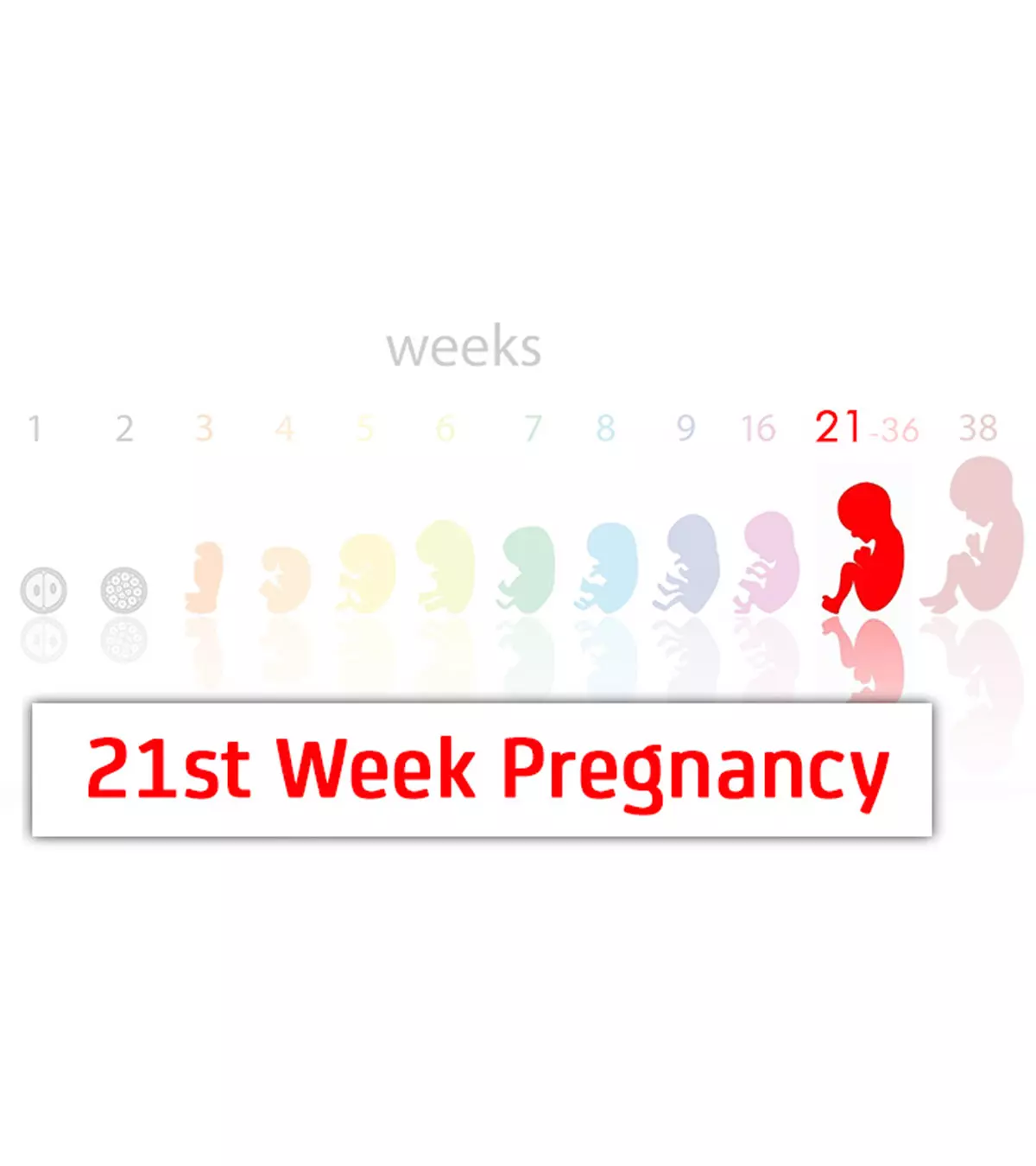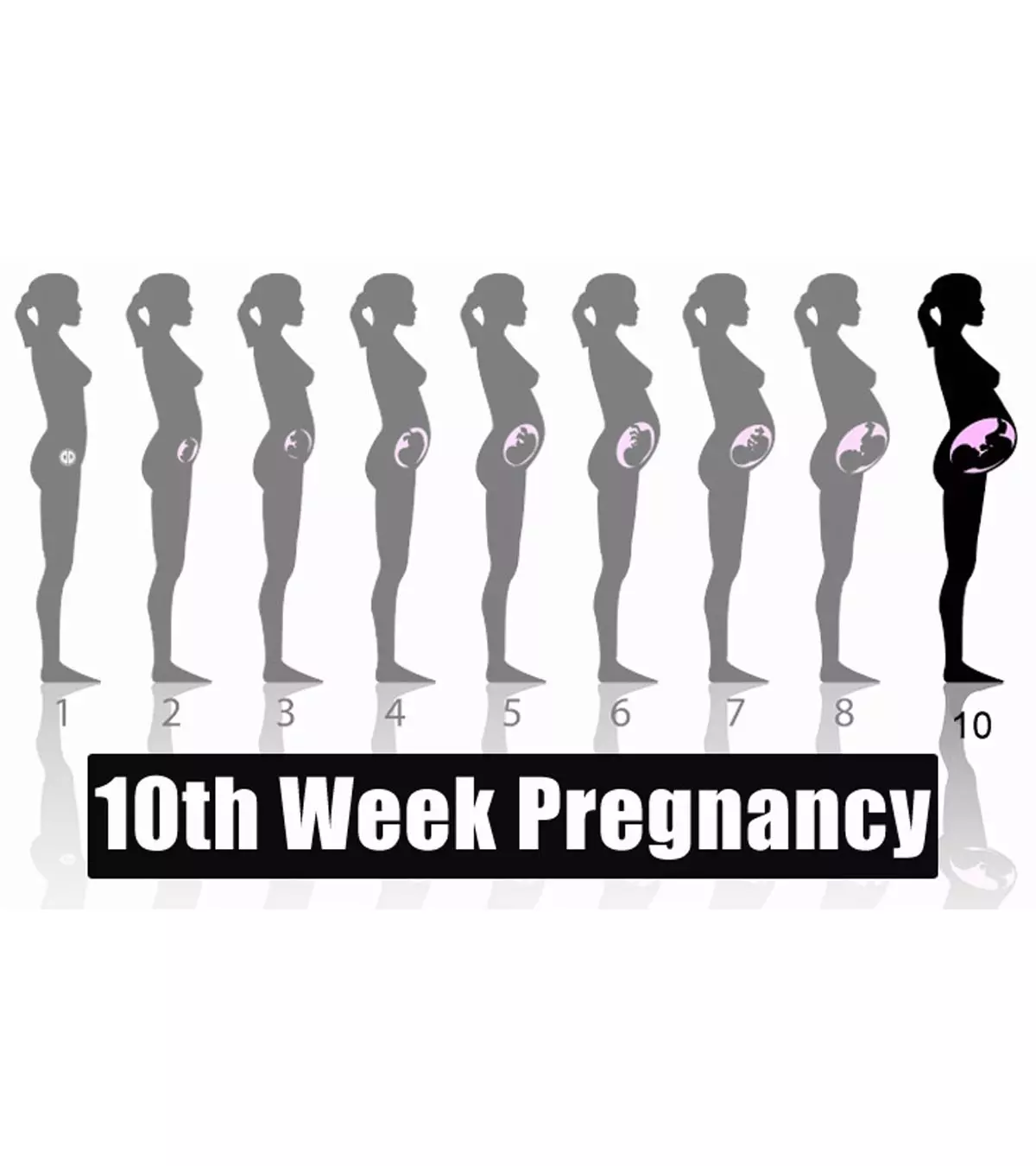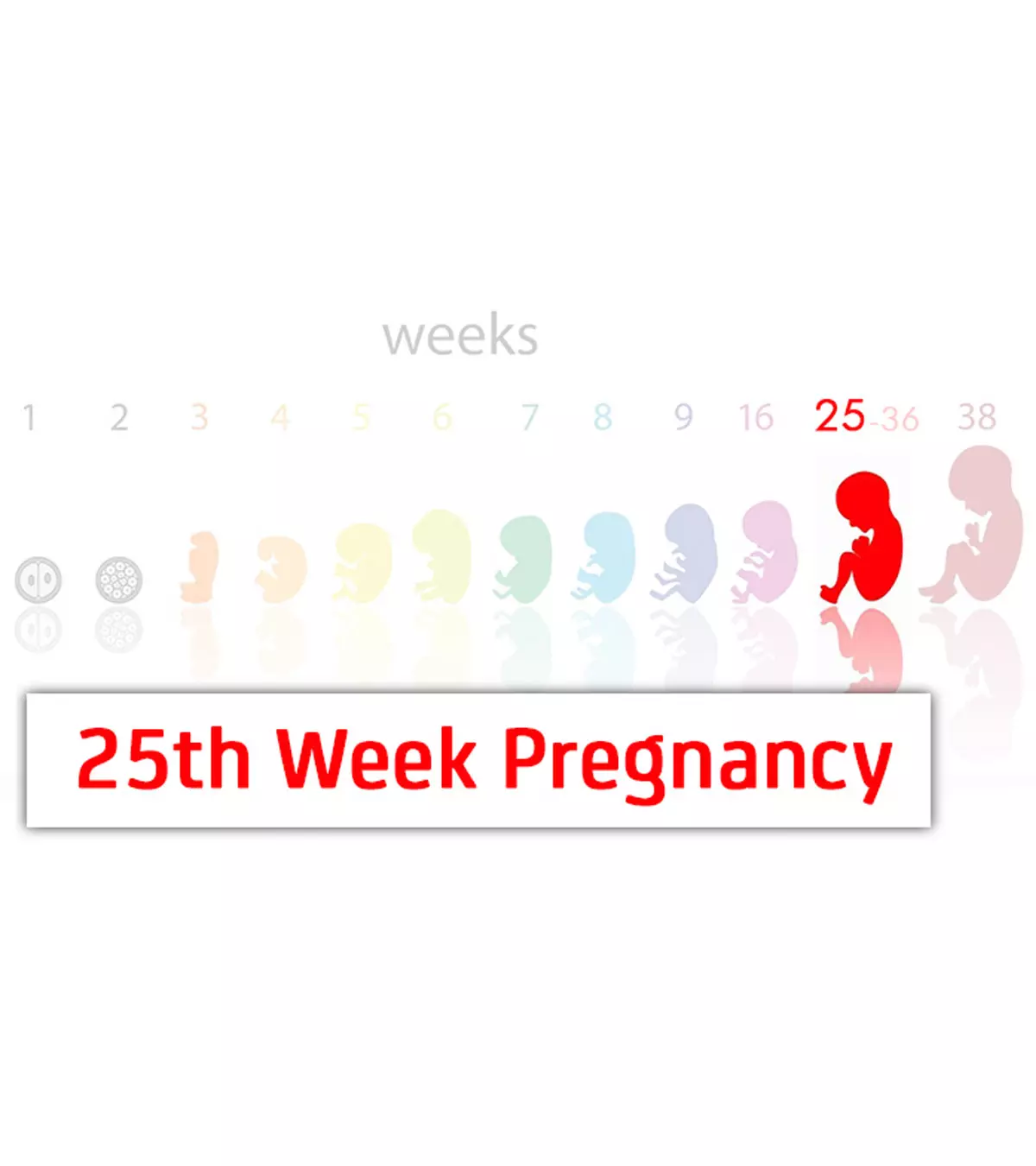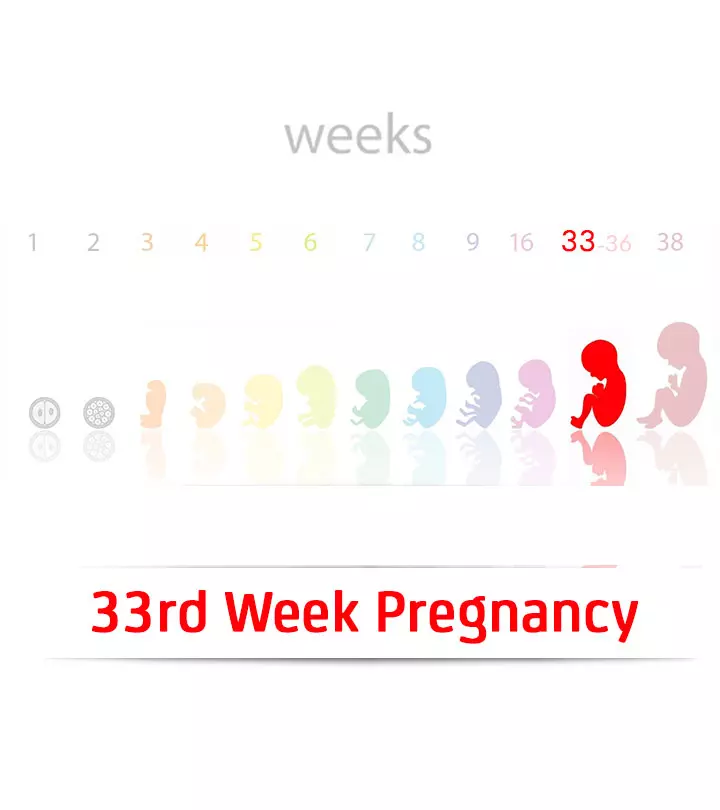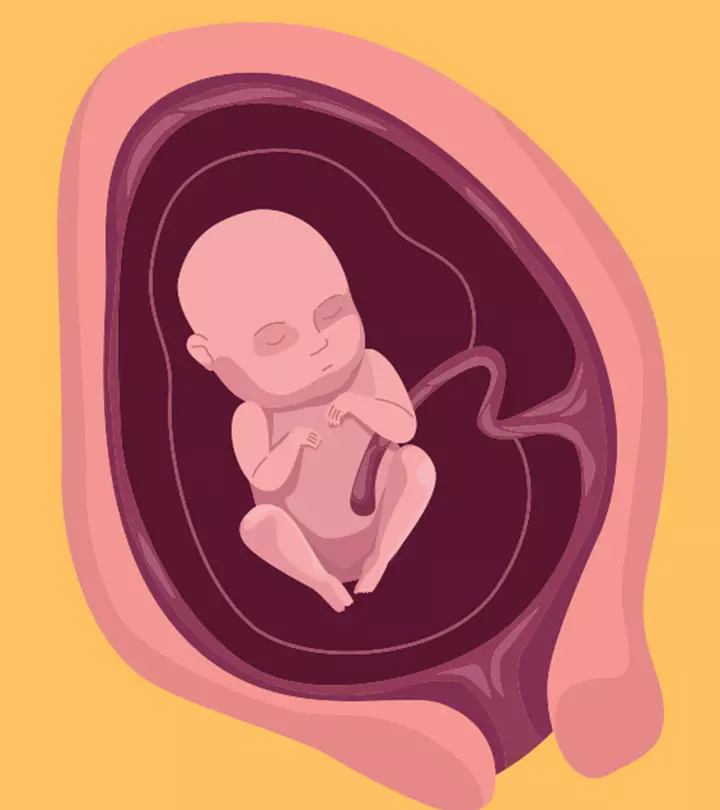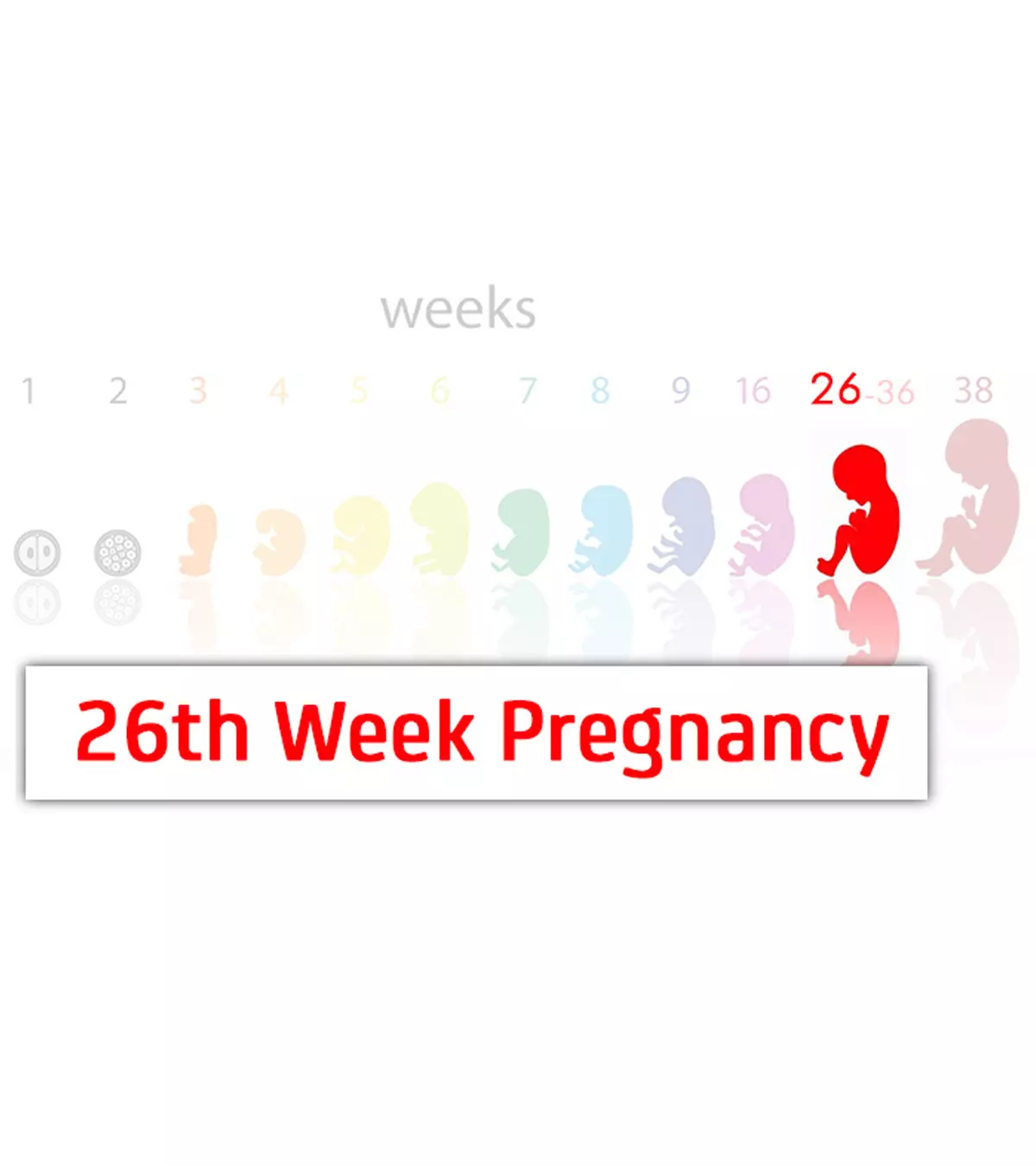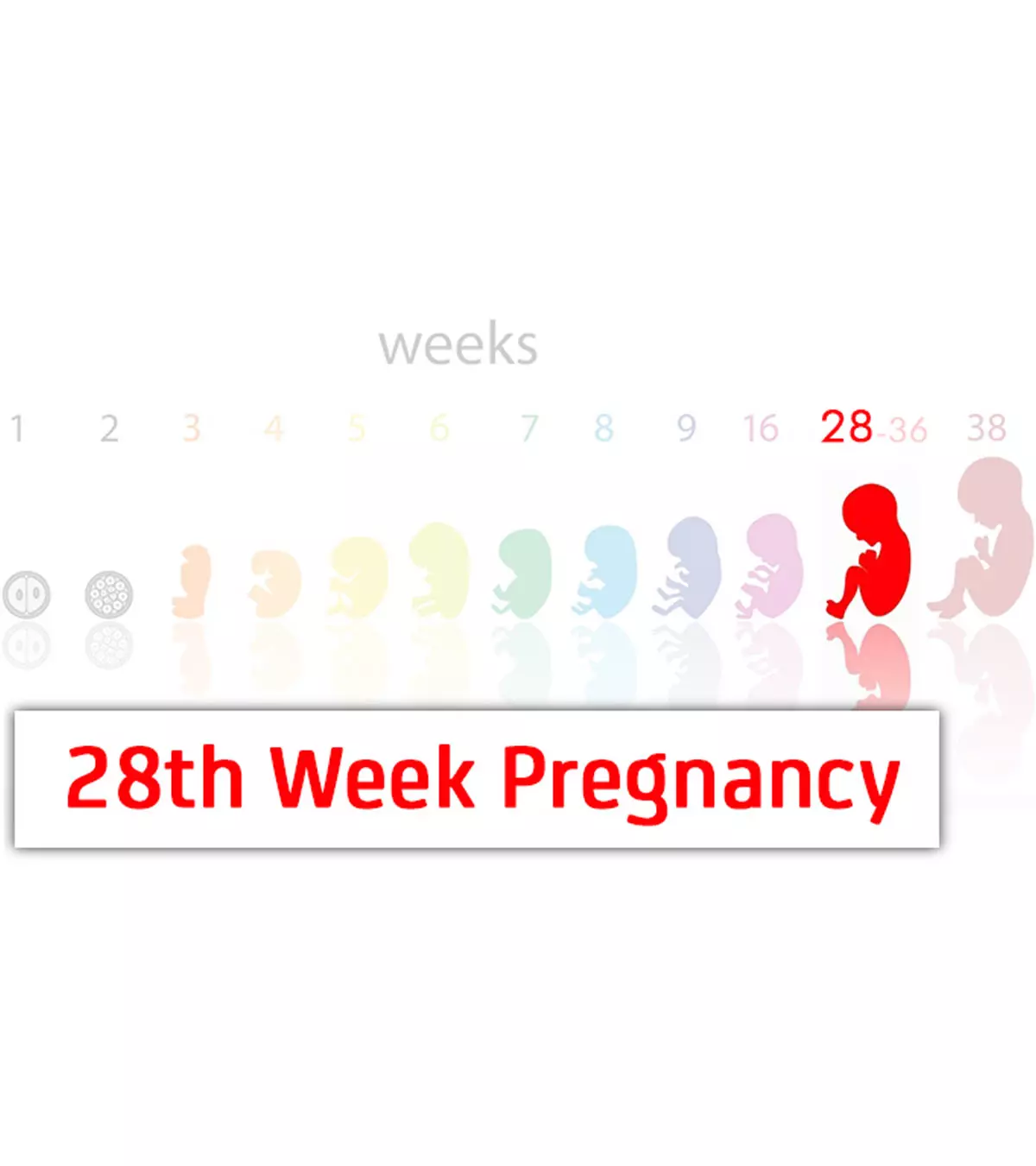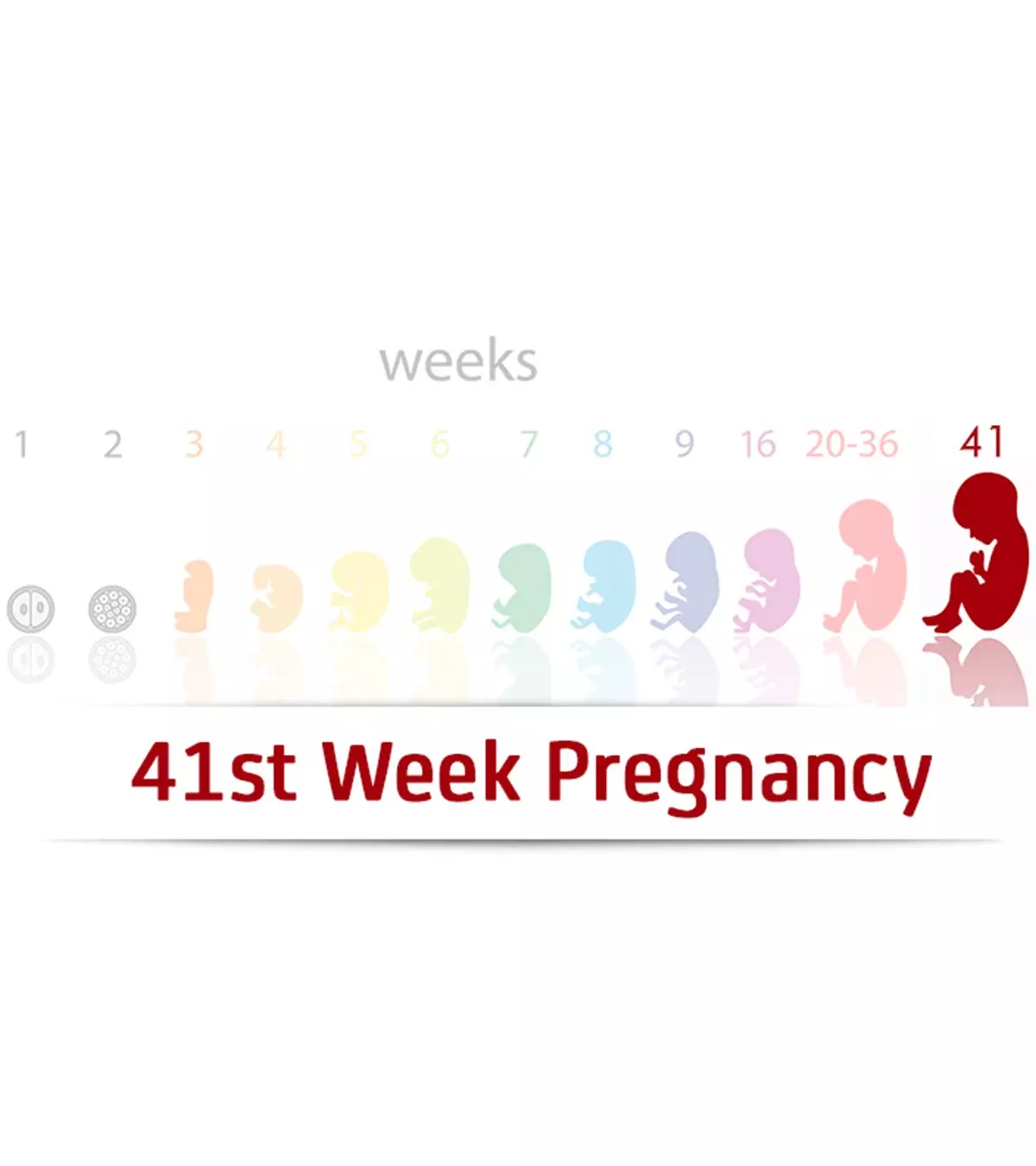
Image: ShutterStock
A full-term pregnancy usually means completing 40 weeks. However, some babies may be born past the 41st week of pregnancy. It is not unusual for babies to be born before or after completing the full-term gestation since only around 5% of births occur on the due date (1).

 Quick fact
Quick factIn this post, we explain the physical changes you may experience and the baby’s development in the 41st week. This post also explains the signs of labor in the 41st week of gestation and some tips for moms and dads-to-be to follow before labor begins.
Key Pointers
- Birth of babies after 41 weeks or the recommended due date is not uncommon.
- At 41 weeks, a baby is typically the size of a watermelon and has fully developed internal organs, along with thick hair, fingernails, and breast buds.
- Pregnant women in their 41st week may experience symptoms such as diarrhea, contractions, hemorrhoids, and pelvic discomfort.
- If labor does not begin on its own by the 41st week, a doctor may recommend labor induction using methods such as sweeping, rupturing the amniotic sac, ripening the cervix, or prostaglandin gel.
- Managing pregnancy symptoms in the 41st week can be helped by spending time with a partner, staying calm, engaging in mild physical activity, and avoiding sleep deprivation.
Stage of Pregnancy At 41 Weeks
At 41 weeks, you are nine months and one week pregnant.
Size Of The Baby At 41 Weeks
The baby is as big as a watermelon this week. Your baby is fully developed by this week and measures around 48-56cm in length and weighs around 3.2-4.1kg (2).
Read on to know how your baby is developing this week inside the womb.
Baby Development In The 41st Week Of Pregnancy
The baby is almost developed by this week (3).
| Organs | Developmental stage |
|---|---|
| Skin | Delicate with pinkish or reddish tones. |
| Internal organs | Fully developed |
| Lanugo | The protective coating of the skin is almost shed by this time into the amniotic fluid. |
| Hair | Thicker and coarser. |
| Fingernails | Grown till the fingertips. bab manicure |
| Breast buds | Present on both the sexes. |
| Skull bones | Not fused but harder. |
When your delivery is overdue, the level of physical discomfort remains the same as before the 40th week of pregnancy. Some of the symptoms you will experience in the 41st week are discussed next.
Symptoms You Experience In The 41st Week
Here are the common symptoms a pregnant woman experiences in the 41st week:
- Pelvic discomfort: The fetus has moved down into the pelvis and starts putting pressure on the pelvic area, causing pain there. It may also increase the urge to pee more than before.
- Hemorrhoids: The pressure of the baby’s weight on the rectal and pelvic nerves causes hemorrhoids, which can be painful. According to a study published in the Frontiers in Surgery journal, around 40% of women suffer from hemorrhoids and anal fissures during pregnancy and postpartum.
- Difficulty in sleeping: The bigger bump and the hormonal fluctuations may disturb your sleep. Using a pillow between the legs while sleeping can help.

- Diarrhea: It may be an indication of your nearing labor because the rectal and intestinal muscles become loose as you head towards labor.
- Ease of breathing: As the baby moves down, the pressure on the diaphragm is released that makes breathing easy.
The physical changes in the body are the same as before. Read more about it next.
Bodily Changes In The 41st Week
The physical changes include (4):
- Enlarged breasts: The breast grows in size as it prepares to lactate, to feed your newborn baby.
- Colostrum leak: Some women can experience leaking of colostrum from the nipples. It is the first form of mother’s milk that your baby will have.
- Blue veins: These are more prominent in the areas like the breast and thighs, as the blood flow will be greater towards these parts of the body.

- Cervix dilatation, effacement, bloody show
- Fetal movement becomes less
The emotional changes include anxiety and mood swings
As your pregnancy is overdue, the doctor will check to know how soon you can get into labor.
Along with the changes mentioned above, there might be some additional discomforts as well that might accompany the 41st week of your pregnancy. Morgan, a mother of two beautiful children, talks about her experiences in the 41st week of pregnancy. She says, “I’d say the hardest thing for me is the physical pain. And the emotional pain of feeling so weak. My body feels like I ran a marathon. Everything hurts, and nothing is comfortable. I am so tired and so awake. My wrists, knuckles, shoulders, and elbows ache all the time. They feel swollen and sore from the time I wake up until I fall asleep, and then they hurt in my dreams. My hips feel like a cinder block is sitting on top of them, roughly wedging itself between them. They cripple me and make me waddle and toss and turn all night long. The hip pain is like nothing I have ever experienced. If I lay on the couch for more than 20 minutes, when I get up, I feel like I am 200 years old like my legs will not hold my body, and I cry. My tailbone hurts to sit on, hurts to lay on, hurts all the time. I hurt all the time. I have never felt this sore, this beaten up in my life. I am 100% miserable. My nipples ache, my stomach aches, my lungs are crushed, my food comes back up. My vagina feels like a bowling ball is pushing down on it… I’m taking each day one at a time. I’m not even that anxious for her to be born, I am anxious to not be pregnant… I am prepared. I am not scared. I am strong. I know I have the fire in me to push through this (i).”
 Research finds
Research findsYour OB/GYN Visit
The doctor will check for the following during your appointment this week (5).
- Weight gain, blood pressure, and urine test for protein.
- Recheck due date and dating scan for confirmation.
- An ultrasound will be done to check the length and weight of your baby, and the abdominal circumference of the baby’s belly.
- Check the position and size of your baby.
- Check the cervix for vaginal dilation.
- If the labor doesn’t start this week, then the doctor may suggest labor induction keeping in mind your health and your baby’s health. It is the time to induce labor as perinatal mortality is high after 41 weeks
 Experts say
Experts sayIf the labor begins this week, then it is necessary that you are aware of its signs. Read on to know about the labor signs you may experience.
Signs Of Labor In The 41st Week
Here are the signs of labor you must look out for in the 41st week of pregnancy (6):
- Baby drops down deep into the pelvis, a phenomenon called lightening.
- A constant water leak, which may indicate the rupture of the amniotic sac.
- Frequent or painful contractions at regular intervals.

If labor doesn’t start on its own, then the doctor may wait for a few more days. In case of any medical emergency, labor will be induced.
Methods considered for labor induction are (5):
- Stripping or sweeping: It involves stripping or sweeping the membranes surrounding the baby, which triggers the release of hormones that start contractions. It is a safe method to induce labor.
- Rupturing the amniotic sac: The doctor uses a plastic hook to rupture the amniotic sac, which in turn stimulates contractions. It is done only after the cervix has dilated.
- Ripening the cervix: It is done using a catheter-like instrument. One side of the tube with a balloon is inserted into the vagina and inflated. This causes the cervix to soften and open. This method can alone or in combination with medications like oxytocin can initiate contractions.
- Administration of oxytocin: IV administration of oxytocin helps induce contractions, which start the labor within 30 minutes of medicine intake. Oxytocin is administered only after the water bag is broken.
- Using prostaglandin gels: The gel is placed near the cervix to soften and open it, and to start the contractions.
The length of the time for the labor to start depends on how your body responds to the medication. After induction, the labor can start within hours or in two to three days.
Reaching the 41st week doesn’t mean that you can skip the healthy regimes. You must maintain a healthy diet and an active lifestyle.
Tips To Follow
The level of anxiety increases after 40 weeks of pregnancy. So try not to miss any prenatal care visits during this week and next week since you are overdue. Here are some of the tips you can follow before labor begins:
- Stay calm: Start packing your delivery bag. In the meantime, stay calm by practicing breathing exercises that can help you during delivery and learn about breastfeeding practices to prepare for the baby’s arrival.

- Get good sleep: You must get enough sleep before you go into labor since you may not get sufficient time to relax after the baby is born as all your attention will drift towards your newborn’s care. Make use of the time to rest properly.
A woman can expect the best support from her partner during pregnancy. So, how can the husband help his wife during this week? Find out next.
Tips For The Dad-to-be
With your partner’s impending labor, you might feel anxious and jittery. Here are some tips that you can follow to ease your anxiety.
Check the insurance and related documents to avoid last minute rush and forgetting important papers at home.
- Know your stuff: Understand what your partner is going through. Listen to the instructions given by your doctor. This will help you to act calmly and do the right thing when your partner’s water breaks.
- Know what she wants: Understand your partner’s wishes while she goes into labor. Try to know how she wants to deliver or what method of induction would she prefer: through IV or the rupturing of the amniotic.

Frequently Asked Questions
1. What causes a baby to be overdue?
The exact cause of a baby being overdue is not known. Sometimes, it may be related to heredity. It is also seen that if a woman had a baby after her due date in one pregnancy, she might have the same in future pregnancies, too (7). Some other causes of going overdue may include being obese, over 30, or pregnant for the first time (8).
2. Are babies born at 41 weeks healthier?
Full-term babies born between 39 and 40 weeks are healthy. Late-term babies born at 41 weeks are generally healthy but sometimes may experience complications, such as loose and peeling skin, overgrown nails, or creases on palms and soles (9).
3. How many days overdue can I go?
If everything is okay, your doctor may allow you to go overdue for up to two weeks. After two weeks, continuing the pregnancy may be risky for your baby’s health (5).
The 41st-week pregnancy might seem scary. The major concern during this period is that a fully developed baby has surpassed the time to enter the new world. In addition, the accompanying discomforts during this period may enhance your worries even more. However, this isn’t an uncommon situation. Hence, ensure to keep up-to-date with your appointments. Keep your Ob/Gyn informed and stay alert for any labor symptoms. The above techniques could help you stay calm while your uterus prepares itself for the delivery of your little one.
Infographic: Signs Of Labor During 41st Week Of Pregnancy
The 40th week of pregnancy marks the full -term, and at the 41st week of gestation, you can enter labor at any time. Therefore, knowing the signs of labor becomes necessary at this stage of pregnancy. Check out the infographic below to learn about the key indicators of labor during the 41st week of pregnancy.
Some thing wrong with infographic shortcode. please verify shortcode syntaxIllustration: 41 Weeks Pregnant: Symptoms Tips And Baby Development

Image: Dall·E/MomJunction Design Team
At 41 weeks pregnant, your baby is ready to be born! Your body is preparing for labor and delivery. Learn more about what to expect this week.
Personal Experience: Source
MomJunction articles include first-hand experiences to provide you with better insights through real-life narratives. Here are the sources of personal accounts referenced in this article.
i. Over due: 40+4;https://thefamilychapters.wordpress.com/tag/40-weeks-pregnant/
References
1. E P Ben-Joseph; What if My Baby Isn’t Born by My Due Date?; The Nemours Foundation
2. Hill. M.A; Fetal Development; UNSW Embryology
3. Pregnancy Week By Week; Due Date Calculator
4. Week 41; Public Health England
5. Overdue babies; Better Health Channel, Victoria
6. When does labor usually start?; NIH
7. Pregnancy and birth: When your baby’s due date has passed; (2025); NCBI
8. Overdue; Pregnancy Birth & Baby
9. Postmaturity in the Newborn; University of Rochester Medical Center
10. Baby due date; Department of Health, State Government of Victoria, Australia.
11. WHO recommendations: Induction of labour at or beyond term; WHO
Community Experiences
Join the conversation and become a part of our nurturing community! Share your stories, experiences, and insights to connect with fellow parents.
Read full bio of Subhashis Samajder
Read full bio of shreeja pillai
Read full bio of Rebecca Malachi
Read full bio of Aneesha Amonz






